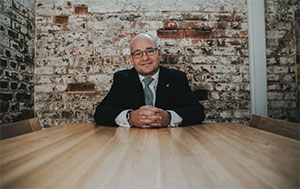The Museums Association Esmee Fairburn Collection Fund has awarded £120,000 to the National Justice Museum to introduce its unique 200-year-old HM Prison Service collection to a wider audience.
The funding supports a three-year project ‘Ingenuity, Creativity, Hope’ involving people in… more
FROM CELLS TO SPEECHES how former inmate Gethin Jones has been Unlocking Potential within prisons
He works extensively with prison managers, officers and other staff to ensure a rehabilitation culture is built and maintained, as well as offering free advice to inmates or residents. So how did Gethin Jones transform his life, from being a repeat offender to an inspiration for custodial staff and prisoners alike?
Gethin Jones is an inspirational speaker, advising prison governors and staff on how to really make an impact on prisoners’ lives. And he should know, as he turned his life around after spending time inside for a string of crimes or, as he puts it, having “a 20-year relationship with the criminal justice system”.
Since making the decision to turn his life around at the age of 34, Gethin has worked for Portsmouth City Council’s public health department and credits a number of prison staff members who believed in him – as they fuelled his need to push himself out of a cell.
Custodial Review editor Victoria Galligan speaks to Gethin about the work he does now with prison staff and also with young offenders. He describes the impetus to change, his own final straw moment, as a time where he had “hit rock bottom, and was bouncing on the bottom of the floor”. And his experience is exactly what puts Gethin in a position perfect for reflection on the running of a prison – clients value his advice so much because of his past.
He says, “I have a unique understanding of the mindset of my clients. But it wasn’t the system that rehabilitated me – it was the individuals that worked within it.
“The criminal part of myself ended over 12 years ago. I started my working career a volunteer, I was then given an opportunity to become part of the Portsmouth City Council, as a Youth Support Worker. This opportunity led me to developing professionally and becoming a service manager, overseeing a staff team of 40 to reduce health inequalities in the most deprived areas of Portsmouth.”
become part of the Portsmouth City Council, as a Youth Support Worker. This opportunity led me to developing professionally and becoming a service manager, overseeing a staff team of 40 to reduce health inequalities in the most deprived areas of Portsmouth.”
Now Gethin spends his days talking as a keynote speaker at events and in prisons, where he offers a range of workshops where his aim is to teach staff how to create change within their prison.
Gethin takes the approach that rapport building is paramount when it comes to prison officers and inmates. Developing good relationships is the only way that inmates will do what you want them to do. He adds, “It’s better with prisoners to under-promise, then over-deliver. Prisoners have been let down by others their whole lives, so making promises you can’t keep is damaging.
“I offer two training programmes that are delivered within prisons – they both have a ‘managers’ and a ‘prison officer’ model.
“The first is a three-hour workshop that
is either for managers or prison officers,
this is loaded with content impacts quickly.
I begin with an icebreaker speech about
my background, then we talk about how to develop a narrative change process. It’s all about creating and developing relationships. We explore the role of the professional – are they there to be practical, or to be human? Sometimes, the practical side overtakes the human side but when we get that balance right... that’s where the magic happens!”
The second type of training is also for prison staff and managers and takes place over three short sessions over ten weeks. Gethin calls this an experiential learning model. The training is based on strategies including the parent-adult- child (PAC) model. A simplistic explanation of the theory is that each of us acts like a parent, adult and child at different times. Gethin said, “It’s about research by Dr Eric Berne, which focuses on self-awareness and emotional intelligence. We look at the simplistic view and how the clients fit into the model – and what happens when the client shifts into the different parts of the model.
“We also look at Steve Covey’s theory of emotional bank accounts – when you interact positively with someone, you make a deposit in the bank account. But when you have a negative interaction, there’s a withdrawal of emotional funds. People work better together when they have a bigger balance in their account. We discuss negative vs positive interactions and how to protect the account and create extra bonds.”
Gethin also discusses challenge and support, which he describes as a “see-saw”, and says at the start of a relationship with
a prisoner, they need more support than challenge. And as the relationship strengthens, support can reduce and challenge increase, achieving the perfect balance.
He adds, “I offer services to prisons that link to my “Buy One Give One” offer. This means that for any keynote or the training procured, I will then give a free talk to inmates or residents in their care.”
On his list of clients are HMP Wormwood Scrubs, HMP The Mount and HMP Woodhill.
Leaders at HMP Brixton were so impressed that he has been invited back to do more training. More prisons are lining up sessions with Gethin and I ask him for an example of when his training has made a tangible impact on the working of the prison.
At HMP Onley, he worked with Kerrie Brooks, Programme Manager and Prison Lead for Rehab Culture, who said, “Gethin listened to the key things I wanted to achieve, which to get staff to ‘buy in’ to the project and to inspire staff to get on board with upcoming work that the project would generate, and talking to residents and sharing his own story of change to show anything is possible.
“Gethin’s Keynote speech titled ‘seeds of hope’ was truly inspirational and reaffirmed with our staff that we can and do change lives.
“On the back of these very successful events I have been asked by residents for more information about charities such as Clinks and other companies that support offenders being released from prison to resettle. I have also been approached by a number of staff from a range of grades and disciplines who want to be more involved in our project work and support our priority to develop a rehabilitative culture.”
At Brixton, Gethin made such an impact that the prison governor Dave Bamford said his speech in the chapel has attracted the biggest audience they’d ever had for a staff brief. Around 220 staff members joined the session and Gethin adds, “I will be going back to deliver more work to support staff identified to lead the OMiC model.”
As well as helping to change cultures within prisons, Gethin works with communities to help improve conditions and with companies and other organisations to boost performance. He has inspired staff at councils, contractors and prisoner support groups including Clinks and Unlocked Graduates.
Paul Baker, director of London and Thames Valley Prison Group says, “Gethin is one the most inspirational speakers I have ever heard. His personal story of transformation lit up the room at a recent event I hosted, and the audience listened with spellbound attention.
“His is a story of hope in the face of adversity and resilience in the face of a society which is quick to condemn and
slow to offer redemption. His narrative that people, not systems and processes, change lives will offer hope to organisations of any size that it is the people they employ who have the power to become instruments of personal transformation and that their effort is worthwhile and of real value every day of their lives.”
It’s clear to see from his portfolio of work that Gethin has become a master of Unlocking Potential. His journey from living behind a cell door to advising governors at prisons across the country is truly inspirational and there is little wonder why many leaders have found Gethin’s training so impactful.
His website is full of testimonials and thought-provoking blog posts and he challenges, “We have all heard the saying, ‘There is no ‘I’ in team’. Well I say, ‘There are three ‘I’s’ in personal ‘responsibility’ – and what are you going to do to improve your team or business?”



